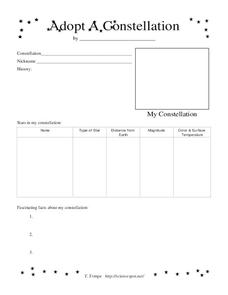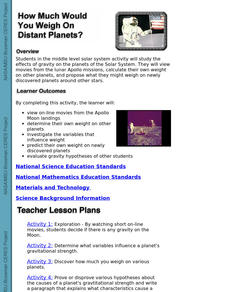Curated OER
The Solar System
In this solar system worksheet, students determine the correct unit of measurement to use when measuring a list of items. Students list the five outer planets and four inner planets. This worksheet has 20 fill in the blank questions.
Curated OER
Illustrate the Constellations
Students explore space science by participating in a star identification activity. In this astronomy lesson plan, students identify different star patterns and discuss the movement of stars across the sky as the seasons change. Students...
Curated OER
Asteroids!
Middle schoolers explore how to visually identify asteroids in SDSS images. They are able to explain that stars are so far away that they do not appear to move, even over the course of a human lifespan. Students identify the location...
Curated OER
The Drake Equation
Students use the Drake Equation to calculate the probability of sustaining life on various planets. Through the use of the equation, they determine whether intelligent and advanced civilizations can be developed on planets other than...
Curated OER
Stellar Evolution and the Fate of Earth
Eighth graders identify the different stages in the life cycle of a star. In this astronomy lesson, 8th graders read H-R diagrams and analyze data. The describe how the Sun's evolution will affect Earth in the future.
Curated OER
Adopt A Constellation
In this space science worksheet, learners discover and write the name of their favorite constellation. Then they describe the history of it and draw a diagram, labeling the major stars and providing lines to show its shape.
Curated OER
Adopt a Constellation
Students adopt a constellation and find detailed information about their constellation. For this constellation lesson plan, students use the web to find information about a constellation of their choice. They identify the history of the...
Curated OER
From Dust Grains to Dust Balls
In this formation of planets worksheet, students solve 6 problems including finding the equation for the mass of rocks as a function of time, finding the equation for the rate of growth of the mass of rocks and integrating these equations.
Curated OER
Grade 8 Science written test
For this science worksheet, 8th graders complete multiple choice questions on plant and animal cells, organisms, planets, and more. Students complete 70 questions.
American Museum of Natural History
A Kid's Guide to Stargazing
Get kids interested in stargazing with a step-by-step guide. The guide begins with the do's and don'ts, what the defines a star, and introduces a journal. The page is linked to see stars if light pollution keeps stars away in your area.
American Museum of Natural History
What is Astronomy?
Go study the universe. Pupils learn seven aspects about astronomy and astronomers. They begin to learn about constellations; distance and motion between objects; gravity; the electromagnetic spectrum; dark matter and energy; and teams of...
American Museum of Natural History
Space Jell-O
A tasty treat lends its curious substance to space exploration. Mimicking the discoveries of Albert Einstein, young astronomers beginning by making a batch of Jello-O, then four hours later, scholars place edible objects that act like...
media.yurisnight.net
Science Lesson Plan: Our Solar System: I Wonder?
Ever wonder why Pluto isn't considered a planet? Or how large the Earth is compared to the other inner planets? Explore the universe with a series of projects that simulate different aspects of our solar system. The activities require...
ESL Kid Stuff
Our World
There's a beautiful world all around us! Learn about the features of our planet with a series of activities designed for English learners. Kids sing, dance, and read about nature with fun lessons and interactive play.
Research Parent
Universe Cards
A 9-page packet comes with 24 cards that have pictures and informational text about each object in the universe. From nebulae to dwarf planets, objects we see—or don't see—are represented in the cards through pictures and words.
Curated OER
Hubble Sees a Distant Planet
In this Hubble telescope worksheet, students solve 4 problems about the image of the distant planet the Hubble telescope discovered. Students determine the distance the planet was from its star in 2006, they determine the planet's...
Curated OER
Meet the Neighbors: Planets Around Nearby Stars
Learners explain why a transiting planet causes a periodic dimming in the light from its parent star. They determine the radius of a planet, and its orbital distance, by analyzing data and manipulating equations. Students compare the...
Curated OER
See the Stars
Students explore the nighttime sky. In this space science lesson, students read the book Maria's Comet and and investigate the sky using their naked eyes. Students compare the view of their naked eyes to the view of a telescope.
Curated OER
The North (Wall) Star
Students engage in a lesson which shows them that celestial navigation is the art and science of finding one's geographic position by means of astronomical observations, particularly by measuring altitudes of celestial objects - sun,...
Curated OER
Scale Model of Our Nearest Stars
Sixth graders calculate a light day, light hour, and light minute from the standard of a light year. After establishing the distances, a one meter scale is created to demonstrate the distance between the sun and the planets of our solar...
Curated OER
How Much Would You Weigh On Distant Planets?
Students study the effects of gravity on the planets of the Solar System. They view movies from the lunar Apollo missions, calculate their own weight on other planets, and propose what they might weigh on newly discovered planets around...
Curated OER
Habitable Zones
Students focus on stellar luminosities to estimate size of habitable zones, map out habitable zone around hot light bulbs that serve as models of stars, investigate how size of model "habitable zone" around light bulbs depends on...
Curated OER
Why do Stars Rise in the East?
For this stars rise in the east worksheet, students use geometry to show how the Earth rotates from west to east and why celestial bodies appear to rise in the east and set in the west. Students draw a figure and label given points in...
Journey Through the Universe
Is There Anyone Out There?
What is an alien's favorite game? All-star baseball! Scholars start defining living and non-living. Then, they conduct experiments to research if life exists, keeping in mind that life could be in many forms, not just human.
Other popular searches
- Space, Stars and Planets
- The Stars and Planets
- Stars and Planets Worksheets
- Compare Stars and Planets
- Stars and Planets Puzzles
- Space Stars and Planets
- Space\, Stars and Planets
- Planets and Stars
- Comparing Planets and Stars
- Space\\, Stars and Planets
- Planets Stars

























